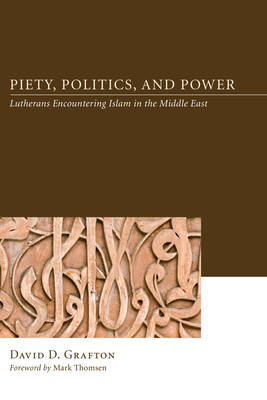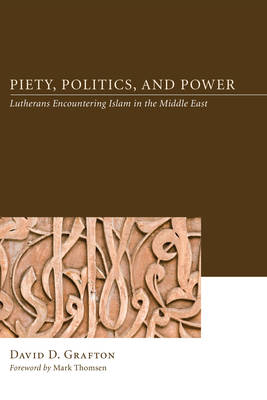
- Retrait gratuit dans votre magasin Club
- 7.000.000 titres dans notre catalogue
- Payer en toute sécurité
- Toujours un magasin près de chez vous
- Retrait gratuit dans votre magasin Club
- 7.000.0000 titres dans notre catalogue
- Payer en toute sécurité
- Toujours un magasin près de chez vous
Piety, Politics, and Power
Lutherans Encountering Islam in the Middle East
David D Grafton
Livre broché | Anglais
52,95 €
+ 105 points
Format
Description
From the time of Martin Luther's writing of "On War Against the Turk" in 1529 to American Lutheran military chaplains serving in the U.S.-led invasion of Iraq in 2003, Lutheranism has had a symbiotic relationship with Islam in the Middle East, framed across cultural and religious borders. There have been those who have crossed these "borders" to engage in mission and dialogue. In Piety, Politics, and Power, David Grafton examines the origins of the American Lutheran missionary movement in the Middle East, with a focus on its encounter with Muslims and the varied Lutheran theological responses toward Islam. The narrative is placed within historical contexts to provide an overarching background of Middle Eastern history and Christian-Muslim Relations. The survey covers Lutheran missionary communities in Persia, Iraq, Egypt, Lebanon, and Jerusalem and the West Bank, including the work of the Lutherans working for the American Board of Commissioners for Foreign Missionaries, the Anglican Church Missionary Society, the Lutheran Orient Mission, the Lutheran Church-Missouri Synod, and the Evangelical Lutheran Church in America. Whether enthusiastic Pietists seeking the conversion of Muslims and Jews; cautious theologians in dialogue with Islam, Judaism, or Oriental Orthodoxy; or social activists working on behalf of refugees in Egypt and the West Bank, Grafton argues that these Christian missionaries were all enmeshed in the politics of the communities in which they lived, and either contributed to or suffered from the realities of Middle Eastern and international politics. Given the current reality of "Pax Americana" in the Middle East, the author asks the driving question about the role of American Lutheran missions and Lutheran-Middle Eastern Muslim dialogue in the age of American power in the Middle East.
Spécifications
Parties prenantes
- Auteur(s) :
- Editeur:
Contenu
- Nombre de pages :
- 312
- Langue:
- Anglais
Caractéristiques
- EAN:
- 9781606081303
- Date de parution :
- 16-03-09
- Format:
- Livre broché
- Format numérique:
- Trade paperback (VS)
- Dimensions :
- 150 mm x 226 mm
- Poids :
- 430 g

Les avis
Nous publions uniquement les avis qui respectent les conditions requises. Consultez nos conditions pour les avis.






